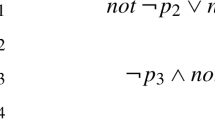Abstract
In this paper we study the properties of the class of head-cycle-free extended disjunctive logic programs (HEDLPs), which includes, as a special case, all nondisjunctive extended logic programs. We show that any propositional HEDLP can be mapped in polynomial time into a propositional theory such that each model of the latter corresponds to an answer set, as defined by stable model semantics, of the former. Using this mapping, we show that many queries over HEDLPs can be determined by solving propositional satisfiability problems. Our mapping has several important implications: It establishes the NP-completeness of this class of disjunctive logic programs; it allows existing algorithms and tractable subsets for the satisfiability problem to be used in logic programming; it facilitates evaluation of the expressive power of disjunctive logic programs; and it leads to the discovery of useful similarities between stable model semantics and Clark's predicate completion.
Similar content being viewed by others
References
K.R. Apt, H.A. Blair and A. Walker, Towards a theory of declarative knowledge, in:Foundations of Deductive Databases and Logic Programs, ed. Jack Minker (Morgan Kaufmann, 1988) pp. 89–148.
S. Arnborg, D.G. Corneil and A. Proskurowski, Complexity of finding embeddings in a k-tree, SIAM J. Algeb. Disc. Meth. 8(2) (1987) 277–284.
R. Ben-Eliyahu and R. Dechter, Default logic, propositional logic and constraints, in:AAAI-91: Proc. 9th Nat. Conf. on Artificial Intelligence (Anaheim, CA, USA, July 1991) pp. 379–385. Full version submitted for journal publication.
R. Ben-Eliyahu and R. Dechter, Inference in inheritance networks using propositional logic and constraints networks techniques, in:AI-92: Proc. 9th Canadian Conf. on AI (Vancouver, B.C., Canada, May 1992) pp. 183–189.
N. Bidoit and C. Froidevaux, Minimalism subsumes default logic and circumscription in stratified logic programming, in:LICS-87: Proc. IEEE Symp. on Logic in Computer Science (Ithaca, NY, USA, June 1987) pp. 89–97.
G. Brewka and K. Konolige, Personal communication (May 1992).
C. Bell, A. Nerode, R.T. Ng and V.S. Subrahmanian, Computation and implementation of non-monotonic deductive databases, Technical Report CS-TR-2801, University of Maryland (1991).
K.L. Clark, Negation as failure, in:Logic and Databases, eds. H. Gallaire and J. Minker (Plenum, New York, 1978) pp. 293–322.
R. Dechter, Enhancement schemes for constraint processing: Backjumping, learning, and cutset decomposition, Artificial Intelligence 41 (1990) 273–312.
R. Dechter, Constraint networks, in:Encyclopedia of Artificial Intelligence, ed. S.C. Shapiro, 2nd Ed. (Wiley, New York, 1992) pp. 276–285.
R. Dechter and J. Pearl, Network-based heuristics for constraint satisfaction problems, Artificial Intelligence, 34 (1988) 1–38.
R. Dechter and J. Pearl, Tree clustering for constraint networks, Artificial Intelligence 38 (1989) 353–366.
T. Eiter and G. Gottlob, Complexity results for disjunctive logic programming and application to nonmonotonic logics, Technical Report CD-TR-92/41, Inst. für Informations Systeme, TU-Wien, A-1040 Wien, Austria (1992).
C. Elkan, A rational reconstruction of nonmonotonic truth maintenance systems, Artificial Intelligence 43 (1990) 219–234.
S. Even,Graph Algorithms (Computer Science Press, 1979).
F. Fages, Consistency of Clark's completion and existence of stable models, Meth. Logic in Comp. Sci. 2 (April 1992).
K. Fine, The justification of negation as failure, Logic Meth. Philos. Sci. 8 (1989) 263–301.
E.C. Freuder, A sufficient condition for backtrack-bounded search, J. ACM 32(4) (1985) 755–761.
M. Gelfond and V. Lifschitz, Classical negation in logic programs and disjunctive databases, New Generation Comp. 9 (1991) 365–385.
M. Gelfond, H. Przymusinska, V. Lifschitz and M. Truszczyński, Disjunctive defaults, in: KR-91:Proc. 2nd Int. Conf. on Principles of Knowledge Representation and Reasoning (Cambridge, MA, USA, 1991) pp. 230–237.
H.A. Kautz and B. Selman, Hard problems for simple default logics, Artificial Intelligence 49 (1991) 243–279.
J. Minker and A. Rajasekar, A fixpoint semantics for disjunctive logic programs, J. Logic Progr. 9 (1990) 45–74.
W. Marek and V.S. Subrahmanian, The relationship between logic program semantics and non-monotonic reasoning, in:Logic Programming: Proc. 6th Int. Conf. (MIT Press, Lisbon, Portugal, June 1989) pp. 600–617.
W. Marek and M. Truszczyński, Autoepistemic logic, J. ACM 38 (1991) 588–619.
W. Marek and M. Truszczyński, Computing intersection of autoepistemic expansions, in:Logic Programming and Non-monotonic Reasoning: Proc. 1st Int. Workshop (Washington, DC, July 1991) pp. 37–50.
T. Przymusinski, On the declarative and procedural semantics of logic programs, J. Automated Reasoning 5 (1989) 167–205.
R. Reiter, A logic for default reasoning, Artificial Intelligence 13 (1980) 81–132.
V.S. Subrahmanian, D. Nau and C. Vago, WFS+branch and bound=stable models, Technical Report CS-TR-2935 (University of Maryland, 1992).
J. Stillman, It's not my default: The complexity of membership problems in restricted propositional default logics, in:AAAI-90: Proc. 8th Nat. Conf. on Artificial Intelligence (Boston, MA, 1990) pp. 571–578.
R. Tarjan, Depth-first search and linear graph algorithms, SIAM J. Comp. 1 (1972) 146–160.
Author information
Authors and Affiliations
Rights and permissions
About this article
Cite this article
Ben-Eliyahu, R., Dechter, R. Propositional semantics for disjunctive logic programs. Ann Math Artif Intell 12, 53–87 (1994). https://doi.org/10.1007/BF01530761
Issue Date:
DOI: https://doi.org/10.1007/BF01530761




